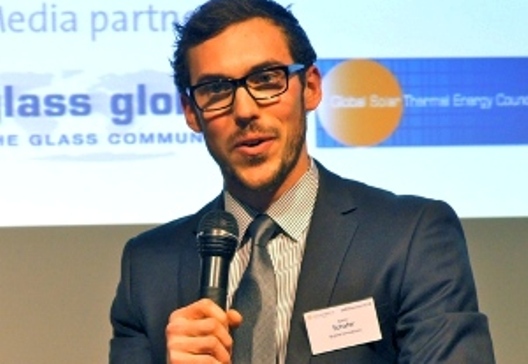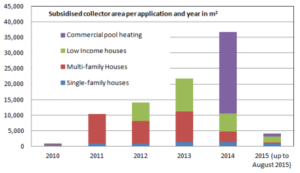“We try to take the complication out of the energy business, not only for our customers, but also for our industry partners.”
February 28, 2014
 Skyline Innovations, the United States’ largest solar thermal developer by project volume, finances, develops, and operates commercial-scale solar thermal systems for small and medium-sized enterprises. Skyline’s customers are able to achieve operational savings from day one by purchasing the renewable energy from Skyline’s system at a fixed discount to their conventional utility. According to the company 104 projects are completed to date, 96 currently in design/build phase, and another 41 signed to be built. Justin Schafer, Product Manager at Skyline, took part in a panel discussion about New Business Models in Solar Thermal at SMEThermal 2014, an international conference for industry professionals held in Berlin on 18 February. Schafer joined Skyline in January 2012 and has worked in sales and marketing in both their Washington, DC and Los Angeles offices. Solarthermalworld.org spoke with Schafer about Skyline´s successful business model.
Skyline Innovations, the United States’ largest solar thermal developer by project volume, finances, develops, and operates commercial-scale solar thermal systems for small and medium-sized enterprises. Skyline’s customers are able to achieve operational savings from day one by purchasing the renewable energy from Skyline’s system at a fixed discount to their conventional utility. According to the company 104 projects are completed to date, 96 currently in design/build phase, and another 41 signed to be built. Justin Schafer, Product Manager at Skyline, took part in a panel discussion about New Business Models in Solar Thermal at SMEThermal 2014, an international conference for industry professionals held in Berlin on 18 February. Schafer joined Skyline in January 2012 and has worked in sales and marketing in both their Washington, DC and Los Angeles offices. Solarthermalworld.org spoke with Schafer about Skyline´s successful business model.Photo: Stephanie Banse
Solarthermalworld.org: Skyline Innovations is a fast-growing company focused on solar thermal. What are the key features of Skyline’s offer?
Schafer: Skyline wants to make the best energy choices as simple and appealing to small business owners as we possibly can. We understand that our customers are busy and don’t often have the time or the resources to investigate the best ways of saving energy, and to pay for it once a solution is in sight. We know solar thermal is one of the best ways to reduce energy consumption and save money, so we have set out to make solar thermal easy.
We take the difficulty out of the decision not only by fully financing the upfront costs of the system, but also to remove any ongoing risk by guaranteeing their price for solar energy will always be a fixed percentage less than conventional energy during their contract with us. To do this, we developed a price-indexed energy model. As you know, the gas boom in the US has caused gas prices to plummet over the last few years, but our clients pay us only for the energy they use from our system and always pay us less for that energy than they would have paid their utility. We also provide complete monitoring and proactive maintenance to make sure that the system is displacing as much fossil fuel as possible with clean, renewable energy. In short, Skyline only makes money when our customers are saving money, which ensures our interests start off and stay aligned. Everybody wins.
Solarthermalworld.org: That sounds too good to be true. How do you generate sufficient revenues to recoup the costs of your investment?
Schafer: To take on all the financial and performance risk and be able to offer our customers such a substantial discount on their energy, we of course need to secure other revenue streams. The United States is a unique market in that it is essentially more than 50 potential markets, with each state, district, or territory having its own rules, regulations, and incentive programs.
The only incentive that applies across the board is the Investment Tax Credit (ITC) from the federal government, which is a tax credit equivalent to 30% of a system’s cost. To monetize the tax credit, though, a company needs to have a sufficiently high tax burden, and that’s not very common. We were fortunate enough to establish a project finance fund with Washington Gas Holdings to be able to make use of the ITC, as have other large solar PV developers in the US with other tax equity funds.
Because of how inexpensive conventional energy currently is, though, we often need to secure additional revenues to make the projects economically viable. Thus far, we’ve been heavily focused on three states that have additional incentive programs: California with the California Solar Initiative Thermal Program as well as Washington DC and the State of Maryland, where Solar Renewable Energy Certificates SRECs are in play. We’re also looking closely at Hawaii, Puerto Rico, and other US markets for further expansion.
Solarthermalworld.org: Is this business model exportable?
Schafer: It can certainly work in other markets, but of course there has to be sufficient incentive for the Energy Services Company, in this case Skyline, to take the risk and offer our solution. We hope that our ability to operate in other markets will grow as equipment and installation costs come down. Additionally, markets with higher energy prices like Puerto Rico allow for us to offer price-indexed energy as well, since the revenues for the energy we provide are more substantial than in the continental US.
Solarthermalworld.org: Solar thermal system suppliers in Europe are hesitant to offer ESCO services to the market. Who could be a good ESCO partner in the future for turnkey solar thermal system providers?
Schafer: They are right to be hesitant: it doesn’t often make sense for an equipment manufacturer to integrate to that extent and offer energy services in addition to the products they produce. It’s entirely dependent on how that decision aligns with the company’s broader strategy and where efficiencies are to be gained.
The ESCO model is nothing new: large corporations like Johnson Controls, Honeywell, and Siemens offer distributed generation and a several other services to their clients. Their model works, but only for certain type of clients, generally in the large-commercial and industrial sectors where economies of scale play a major role.
We wanted to be an ESCO for an often-overlooked customer segment: the small to medium commercial market. That’s actually a sizable segment by volume – really anything larger than a single-family home but smaller than a big box store or retail complex. Serving this market requires a new kind of business model. We needed to ensure that we would lower our customers’ utility costs no matter what, and we needed the financing and internal processes to be so efficient that we could operate profitably without benefitting from the economies of scale that larger ESCOs enjoy.
We try to take the complication out of the energy business, not only for our customers, but also for our industry partners. We want the component manufacturers we work with to be the best at what they do, focusing on improving the quality of their products and maximizing their internal efficiencies while letting us be their sales and marketing force and interacting with the market. We firmly believe that this is the best way to make solar thermal relevant and desirable to our customers, and we aim to revolutionize the entire industry through this approach.
More information:


